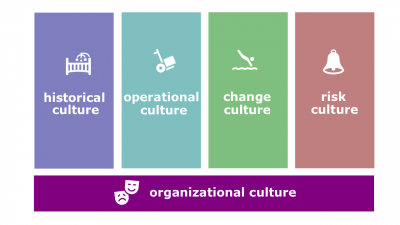Difference between revisions of "Organizational culture"
MariamKhalid (talk | contribs) |
|||
| Line 1: | Line 1: | ||
| − | [[File:Organizational-culture.png|400px|thumb|right|[[Organizational culture]]]][[Organizational culture]] (hereinafter, the ''Culture'') is a system of the shared meaning, values, principles, traditions, and ways of doing things held by members of the [[organization]] that influence the way organizational members act and that distinguish the organization from other organizations. | + | [[File:Organizational-culture.png|400px|thumb|right|[[Organizational culture]]]][[Organizational culture]] (alternatively known as [[corporate culture]]; hereinafter, the ''Culture'') is a system of the shared meaning, values, principles, traditions, and ways of doing things held by members of the [[organization]] that influence the way organizational members act and that distinguish the organization from other organizations. |
| Line 8: | Line 8: | ||
According to [[Management by Robbins and Coulter (14th edition)]], | According to [[Management by Robbins and Coulter (14th edition)]], | ||
:[[Organizational culture]]. The shared values, principles, traditions, and ways of doing things that influence the way organizational members act and that distinguish the organization from other organizations. | :[[Organizational culture]]. The shared values, principles, traditions, and ways of doing things that influence the way organizational members act and that distinguish the organization from other organizations. | ||
| + | |||
| + | According to [[Marketing Management by Keller and Kotler (15th edition)]], | ||
| + | :[[Corporate culture]]. The shared experiences, stories, beliefs, and norms that characterize an organization. | ||
==Parts== | ==Parts== | ||
| − | Every | + | Every ''Culture'' can be divided in four parts: (1) [[historical organizational culture]] or the culture envisioned by the founders and others that is no longer executed, (2) [[operational culture]] or the culture exercised by an enterprise today for its [[operations]], (3) [[change culture]] or the culture related to change in the enterprise, and (4) [[risk culture]] or the culture related to handling risks. |
==Related concepts== | ==Related concepts== | ||
| Line 20: | Line 23: | ||
*[[Organizational Culture Quarter]]. | *[[Organizational Culture Quarter]]. | ||
| − | [[Category: Management]][[Category: Septem Artes Administrativi]][[Category: Articles]] | + | [[Category: Management]][[Category: Septem Artes Administrativi]][[Category: Marketing Management]][[Category: Articles]] |
Revision as of 21:06, 21 June 2020
Organizational culture (alternatively known as corporate culture; hereinafter, the Culture) is a system of the shared meaning, values, principles, traditions, and ways of doing things held by members of the organization that influence the way organizational members act and that distinguish the organization from other organizations.
Definitions
According to Organizational Behavior by Robbins and Judge (17th edition),
- Organizational culture. A system of shared meaning held by members that distinguishes the organization from other organizations.
According to Management by Robbins and Coulter (14th edition),
- Organizational culture. The shared values, principles, traditions, and ways of doing things that influence the way organizational members act and that distinguish the organization from other organizations.
According to Marketing Management by Keller and Kotler (15th edition),
- Corporate culture. The shared experiences, stories, beliefs, and norms that characterize an organization.
Parts
Every Culture can be divided in four parts: (1) historical organizational culture or the culture envisioned by the founders and others that is no longer executed, (2) operational culture or the culture exercised by an enterprise today for its operations, (3) change culture or the culture related to change in the enterprise, and (4) risk culture or the culture related to handling risks.
Related concepts
- Strong organizational culture. An organizational culture in which the key values are intensely held and widely shared.
- Positive organizational culture. An organizational culture that emphasizes building on employee strengths, rewards more than punishes, and emphasizes individual vitality and growth.
- Organizational subculture. A miniculture within an organization, typically defined by department designations and geographical separation.
